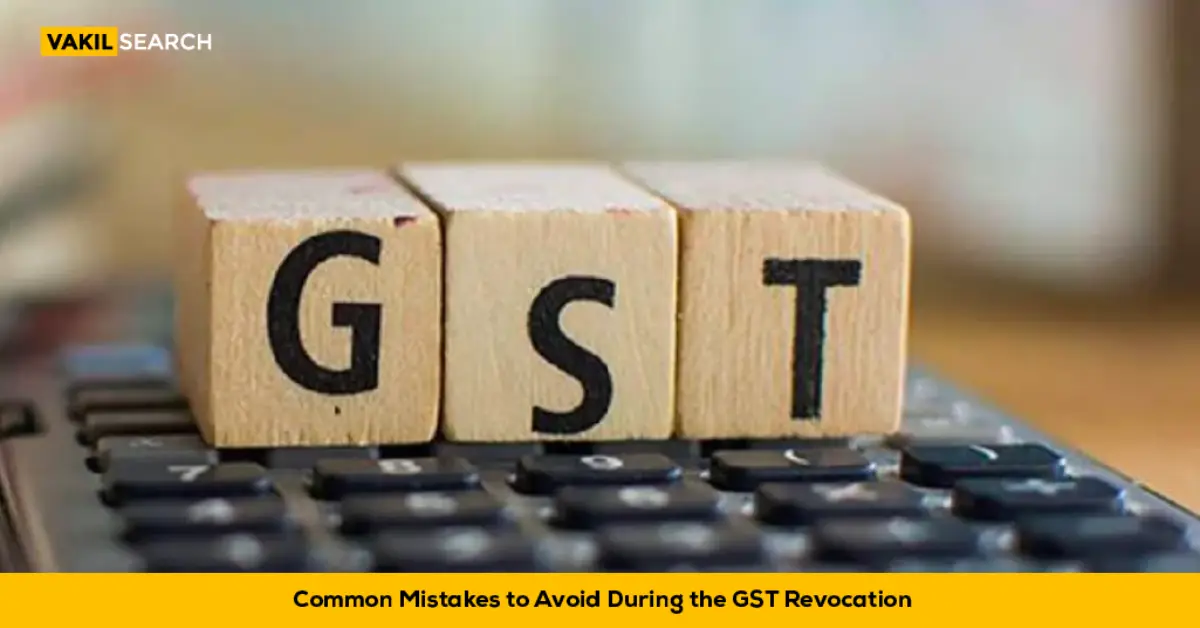Identify and mitigate common mistakes associated with the GST revocation. From procedural missteps to compliance oversights, this article highlights key errors to avoid when navigating the process of GST deregistration to ensure regulatory compliance and financial integrity.
The Goods and Services Tax (GST) system, implemented in India in 2017, has streamlined tax processes for businesses. However, navigating its complexities, especially when dealing with the revocation of a GST registration, can be challenging. The process of revocation involves reversing the cancellation of a GST registration, allowing businesses to continue operating under the GST framework. Unfortunately, many businesses make mistakes during this process, leading to delays or rejections.
This article highlights common mistakes to avoid during the GST revocation process and offers guidance on how to manage the process effectively.
Lack of Understanding of the Revocation Process
One of the most significant mistakes businesses make is not fully understanding the GST revocation process. The procedure involves several steps, including applying for revocation, providing necessary documentation, and complying with specific deadlines. Failure to understand these steps can lead to incomplete applications and delays. It’s crucial to familiarize yourself with the GST laws and guidelines related to revocation. The GST portal provides resources and updates that can help businesses stay informed.
Inadequate Documentation
Proper documentation is critical for the successful revocation of GST registration. Many businesses fail to provide all the required documents, leading to the rejection of their applications. Essential documents include proof of compliance with previous GST returns, evidence of addressing the reasons for cancellation, and other relevant records. Ensuring that all documents are accurate, complete, and up-to-date can significantly enhance the chances of a successful revocation.
Failure to Notify Relevant Authorities
Failing to notify relevant authorities about changes or updates related to your GST registration can hinder the revocation process. This includes informing authorities about changes in business address, contact information, or business activities. Keeping authorities updated helps maintain accurate records and ensures smooth communication during the revocation process. Always check that your business details are current in the GST portal before applying for revocation.
Incorrect Calculation of Liabilities
Another common mistake is the incorrect calculation of tax liabilities. Businesses must ensure that all GST liabilities are accurately calculated and paid before applying for revocation. Miscalculations can result in outstanding dues, leading to the rejection of the revocation application. It’s advisable to double-check all calculations and, if necessary, seek the assistance of a GST professional to verify the accuracy of your tax liabilities.
Ignoring Compliance Requirements
Compliance with GST regulations is essential for a successful revocation process. Many businesses overlook compliance requirements, such as filing pending GST returns or rectifying previous errors. Non-compliance with these requirements can result in the rejection of the revocation application. To avoid this, ensure that all past GST returns are filed, and any discrepancies are addressed before submitting the revocation application.
Not Seeking Professional Advice
Navigating the GST revocation process can be complex, and many businesses make the mistake of not seeking professional advice. GST professionals, such as chartered accountants or tax consultants, have the expertise and knowledge to guide businesses through the revocation process. They can help identify potential issues, ensure compliance, and increase the chances of a successful application. Investing in professional advice can save time and prevent costly mistakes.
Misinterpreting Transitional Provisions
Transitional provisions refer to the rules and guidelines that govern the transition from previous tax regimes to GST. Misinterpreting these provisions can lead to errors in the revocation process. Businesses need to understand how transitional credits and liabilities are treated under GST to avoid mistakes. Reviewing the GST law and consulting with professionals can help clarify these provisions and ensure accurate compliance.
Overlooking Input Tax Credit Adjustments
Input Tax Credit (ITC) adjustments are another area where businesses often make mistakes. ITC allows businesses to claim credit for the GST paid on purchases used to make taxable supplies. During the revocation process, it’s essential to correctly adjust ITC claims to avoid discrepancies. Overlooking ITC adjustments can result in inaccuracies in tax liabilities and affect the revocation application. Ensure that all ITC claims are accurate and supported by valid documentation.
The Takeaway
By avoiding these common mistakes, businesses can navigate the GST revocation process more effectively and increase their chances of a successful application. It is essential to stay informed, comply with all requirements, and seek professional assistance when necessary.
In conclusion, managing the GST revocation process requires attention to detail, compliance with regulations, and a clear understanding of the requirements. By avoiding the common mistakes outlined above, businesses can ensure a smoother revocation process and maintain their GST registration status. For expert guidance and assistance with GST registration and return filing, Vakilsearch offers comprehensive services to help businesses stay compliant and manage their GST obligations effectively.
FAQs on Common Mistakes to Avoid During the GST Revocation
How does failing to address the original reasons for GST cancellation impact the revocation process?
Failing to address the original reasons for GST cancellation can lead to the rejection of the revocation application. Authorities need assurance that the issues leading to cancellation have been resolved to approve the revocation.
Why is it important to ensure all pending GST returns are filed before applying for revocation?
Filing all pending GST returns is crucial because non-compliance with return filing requirements can result in the rejection of the revocation application. It demonstrates compliance and rectification of previous lapses.
What risks are involved in not consulting a GST professional during the revocation process?
Not consulting a GST professional can lead to errors and omissions in the revocation application. Professionals provide expertise, ensure compliance, and help navigate the complexities of GST laws, increasing the chances of a successful application.
How can misunderstanding the eligibility criteria for GST revocation lead to rejection?
Misunderstanding the eligibility criteria can result in applying for revocation without meeting the necessary conditions, leading to rejection. It's essential to thoroughly review the criteria and ensure compliance before applying.
What are the implications of not responding promptly to any queries from the GST department during the revocation process?
Not responding promptly to queries from the GST department can delay the revocation process and lead to the rejection of the application. Timely and accurate responses are essential to address any concerns and move the process forward.
Why is it a mistake to overlook any outstanding GST liabilities before applying for revocation?
Overlooking outstanding GST liabilities can result in an incomplete application and rejection. Clearing all dues demonstrates compliance and rectifies previous lapses, essential for a successful revocation application.
How does neglecting to update business details in the GST portal affect the revocation application?
Neglecting to update business details can lead to discrepancies and miscommunication, affecting the revocation application. Accurate and current business information is crucial for maintaining compliance and facilitating smooth processing.










